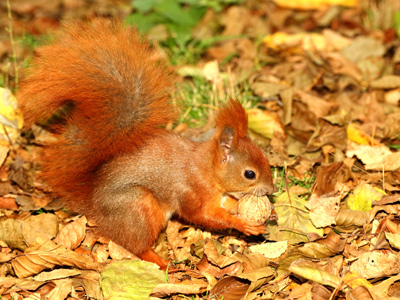
Ask the AI Tutor
Need help with Verbs (Basics) 01? Ask our AI Tutor!
AI Tutor - Lucy
Connecting with Tutor...
Please wait while we establish connection

When you say "The squirrel ate the nut" it is the word "ate" that is the verb in the sentence.
Verbs (Basics) 01
Verbs show actions and states. Learn how strong, precise verbs make KS3 writing clearer, livelier, and more accurate.
1 .
Find the verb(s) in the following sentence.
The family entered the museum and looked at the plan.
The family entered the museum and looked at the plan.
entered, looked
family, museum
family, plan
museum, plan
Verbs are action words: "entered" and "looked" are actions
2 .
Find the verb(s) in the following sentence.
The science museum displayed many exciting exhibits.
The science museum displayed many exciting exhibits.
displayed
exciting
museum
science
"Displayed" is the verb here
3 .
Find the verb(s) in the following sentence.
The family visited the space section first.
The family visited the space section first.
family
section
space
visited
"Visited" is the action word here; it is what the family DO
4 .
Find the verb(s) in the following sentence.
Old cars and trains filled the next floor of the museum.
Old cars and trains filled the next floor of the museum.
cars
filled
floor
trains
Use a variety of verbs to make your writing interesting
5 .
Find the verb(s) in the following sentence.
"Eat your lunch now," said the mother.
"Eat your lunch now," said the mother.
Eat, said
lunch, mother
your, mother
your, now
Other verbs for "said" include "told", "uttered" and "declared"
6 .
Find the verb(s) in the following sentence.
They climbed to the third floor.
They climbed to the third floor.
climbed
floor
They
third
Other verbs for "climbed" include "ascended" and "clambered"
7 .
Find the verb(s) in the following sentence.
The sunlight streamed through the large windows.
The sunlight streamed through the large windows.
large
streamed
sunlight
windows
Other verbs for "streamed" include "poured" and "flooded". Synonyms for verbs are, unsurprisingly, also verbs
8 .
Find the verb(s) in the following sentence.
The lifts carried people to the top floor.
The lifts carried people to the top floor.
carried
floor
lifts
people
Other verbs for "carried" include "transported" and "took"
9 .
Find the verb(s) in the following sentence.
The museum closed at five o'clock.
The museum closed at five o'clock.
closed
five
museum
o'clock
"Closed" is what the museum DID
10 .
Find the verb(s) in the following sentence.
Thunder crashed as they ran home through the rain.
Thunder crashed as they ran home through the rain.
crashed, ran
home, rain
they, the
Thunder, home
"Crashed" and "ran" are both action words, or, in other words, verbs
**Unlimited Quizzes Await You! 🚀**
Hey there, quiz champ! 🌟 You've already tackled today's free questions.
Ready for more?
Ready for more?
🔓 Unlock UNLIMITED Quizzes and challenge yourself every day. But that's
not all...
not all...
🔥 As a Subscriber you can join our thrilling "Daily Streak" against other
quizzers. Try to win a coveted spot on our Hall of Fame Page.
quizzers. Try to win a coveted spot on our Hall of Fame Page.
Don't miss out! Join us now and keep the fun rolling. 🎉
**Unlimited Quizzes Await You! 🚀**
Hey there, quiz champ! 🌟 You've already tackled today's free questions. Ready for more?
🔓 Unlock UNLIMITED Quizzes and challenge yourself every day. But that's not all...
🔥 As a Subscriber you can join our thrilling "Daily Streak" against other quizzers. Try to win a coveted spot on our Hall of Fame Page.
Don't miss out! Join us now and keep the fun rolling. 🎉






